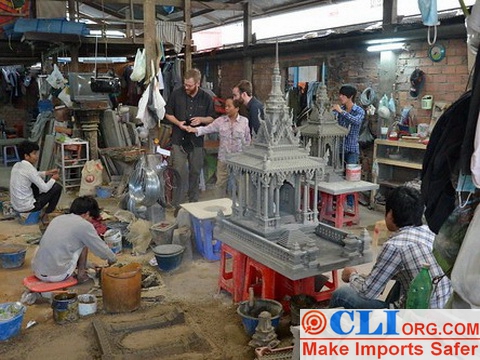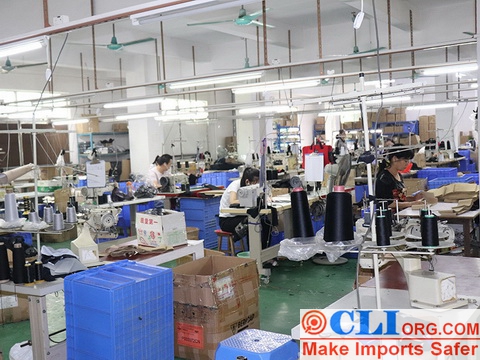What importers need to pay attention to when sourcing new factories
By Jackson Wong • 01/4 @ 9:14 • What importers need to pay attention to when sourcing new factories已关闭评论
Foreign importers often choose to source imported products from China in order to start or expand their business, which is a wise choice. This is because most products have a complete supply chain in China, whether the importer needs to buy raw materials or accessories, or even equipment. And the prices that Chinese suppliers give to importers are often economical and affordable.
As long as the importers who understand the rules of international trade know that factories are more secure than suppliers, they are smart enough to tend to avoid suppliers and develop their own Chinese factories. But it is not as simple as you think, although there is no middleman to earn the difference, but communication does have limitations. And importers of different strengths should choose a development path that suits them. Sometimes a reliable supplier can really help you buy all kinds of products at different prices. I hope importers will read the following before developing their factories, these are the problems you will meet in the future.
Do importers who are just starting out need to sourcing their own factories ?
Generally speaking, fledgling importers are relatively small themselves and do not have in-depth knowledge of the products or the Chinese supply chain. There are not many factories they are familiar with, and they choose to buy directly from their suppliers. That’s right! The supplier has a strong supply chain, involving a wide variety of products, and the factory resources in hand could be bound into a book! And the salesman has good English communication skills and can provide the best service. Small importers buy products with more models and less volume. If you find a reliable supplier to work with, the supplier can get a better price from a different factory. Because suppliers work with new customers for the first time or the first few times, they are willing to give the best price even though the volume is small. Plus the first time cooperation, the process is more troublesome, need to make samples, develop new molds, debug machines, print box marks, etc.. But they understand that the growth of customers need time to settle, once the customer’s subsequent development has taken off, can bring itself greater profit margins.

But if a new importer finds a factory directly on Alibaba and the order is not yet large, the factory will offer a very high price. This is also a norm. Factories generally give very low prices to big customers, because they give most of their annual production capacity to big customers, and rely on this profit to keep the factory running, pay rent, pay workers, etc.. For the rest of these small customers, the factory will leave the profit point higher. But the importers who are just starting out know nothing about this, and it is obvious that it is not cost effective.
What kind of importers need to sourcing their own new factories ?
When importers grow to a certain size, the number of imports increases significantly. They have their own more regular consumer groups, find their own product positioning in the market, and deepen their understanding of the products and consumers as well as the related industrial chain in China. They can say that they are a China generalist now. Such importers in the continuous trial and error to eliminate some of the low sales of the style, the main focus on those explosive products. And the explosive products, because of repeated imports, importers and factories have passed the break-in period. Such factories can give the importer more trust. Relatively speaking, the rest of the factory can be eliminated from the supply chain. Together with the help of third-party quality inspection companies and consumer reviews, importers are clearer about their own level of development and what kind of factory is the target of cooperation.
Such importers have gradually accelerated and can escape the control of the supplier. Because the supplier generally keep at least 4~10 % or more for profit. For the importer, is a completely omitted cost, which can greatly increase the profitability of the product. This situation is the supplier’s greatest concern, but there is no way, adult children are destined to leave their parents. In general, importers belonging to the following categories can start looking for their own factories.
- Single product category, but a large number of orders.
- No more than five product categories and have different brands.
- Special products for specific people.

How importers source new factories ?
In fact, the whole development process is very complicated, but the importer chooses to find their own factory, and choose not to use suppliers, indicating that the importer is willing to spend time to find. But the mentality should be good, there are hundreds of thousands of factories throughout China, it is normal to find a satisfactory factory for a while. Especially for new categories and new factories, it takes more time to determine the strength and credibility of the factory.
Sourcing channels
First of all, importers can choose to help from acquaintances, such as CLI inspection company, know the factories in the north and south. Although the quality varies, but we are happy to help importers, from the existing resources of the factory to select the matching importer cooperation objects. Such factories are more credible, and CLI will only recommend some candidate factories based on the quality of their products. In fact, this is one of the types of services we provide.
Secondly, importers can screen factories from Alibaba, but note that despite the platform’s controls, what kind of factory each is still to be developed by importers with sharp eyes. In this process, the importer should be clear about the main production base of the product in China, that is, the location of the supply chain. And then develop the corresponding regional factories, so as not to be confused. The reasoning is simple, because things are grouped together, people are divided into groups, a class of products related to all factories are basically in a region, so that the transportation costs between them is not too high. Thus, more energy is invested in product quality.
Factory Type
As the saying goes: what suits you is the best. The same is true for importers choosing factories. I believe that every importer is very clear about their own positioning and knows clearly which type of factory is the target of long-term cooperation. In fact, there are only two types of factories: industrial and trade integration and no trade department factories. Honestly, who wouldn’t want to find a factory with an integrated trade and industry department? After all, this type of factory not only has no communication barriers, but also the quality of the products can be guaranteed. In many cases, they do not have logistics problems that can affect the delivery time.
But a factory without a trading department is not useless. All factories start small and grow to have business development capabilities. It’s just that many factories without a trading department simply choose to rely on suppliers, their production capacity is limited and small orders are their rule of survival.
Factory Audit
After the cooperative factory is identified, then its authenticity should be verified. Most importers will visit the factory during the Canton Fair to see if its business model and production capacity meet the prerequisites for cooperation. It is indeed the best way for importers to go to the factory to verify in person, because face-to-face communication is much more interesting than cold words! Whether the factory is cheating you, whether the business really wants to maintain long-term cooperation with you, perhaps the importers who have studied psychology can see at a glance.
But at this stage, the COVID-19 of the extraordinary period, is unable to make the above verification methods as always. I am afraid that the only one who can send charcoal in snow is the third party inspection. This year, our factory audit also hit a record high, but we do not thank the COVID-19. Because this is the harvest of our years of sincere service! Comprehensive factory audit not only checks the quality technology and supply chain safety of factories, but also audits the social responsibility of factories. It helps importers to further understand whether the information provided by the factory upfront is correct, so as to determine the possibility of cooperation.
Sample Confirmation
At this point, the cooperation has taken shape. The existence of samples is the epitome of a big shipment, discovering in advance the problems that may occur with the product so that raw materials can be replaced or production processes can be improved in advance. However, in the sample confirmation, the importer and the factory will be involved in the payment of sampling fees and courier charges. I suggest that the importer must confirm with the factory in advance the payer of the cost to avoid unnecessary troubles in the subsequent cooperation.
Needless to say, CLI has also introduced a tailor-made service for samples: sample audit. That is, the importer can ask the factory to send the samples to CLI, eliminating the cost of international courier. CLI’s QA&QC department will review the samples and the importer will confirm whether the samples pass the review.
After the above four steps are completed, basically, the importer can wait for the production of the big goods with confidence. It is just a matter of continuing to follow up on the quality changes of the big shipment during the production process to avoid causing consumer returns.
CLI Inspection’s Comments And Summary
We all know that it’s not easy for importers to make the decision to find their own factories. Because there are so many differences between different factories, so it is more important to make a careful decision. However, from the Chinese factories I have contacted, they attach great importance to new customers, and most of them will give the first order to new customers even if they don’t make money. Because they know that the importer will grow, the factory and the importer is a win-win and common growth relationship. So importers do not have to be too suspicious, the bad ending in the article are the worst case, most of the Chinese factories are credible.
Finally, I hope you can all find the right factory to your satisfaction!
This article is an original article for CLI Inspection, who is committed to providing high-quality product inspection technology and know-how sharing for global importers and retailers to make imports safer.
All rights reserved. The contents of this website provided by CLI Inspection may not be reproduced or used without express permission.
For reprint, please contact with CLI Inspection, thank you.
Jackson Wong
Senior professionals in the field of quality inspection are committed to finding and sharing valuable experiences.
SEARCH
Email Subscribers
Recent Posts
- register-081823 08/18 @ 8:03
- A Few Tricks to Teach You How to Easily Buy Luggage Case Bags With High Cost Performance ? 04/20 @ 8:47
- You Can’t Imagine That A Big Brand Like KAPPA Will Find Serious Batch Problems During Inspection! 04/13 @ 9:08
- Folding Table: Technological Comparison Between Two Factories 04/6 @ 8:45
- Are You Still Worried About Clothes Damaged by Hangers? 03/29 @ 8:26
Recent Comments
Monthly Files
Catalogue
Tags
BLOG
- register-081823 08/18 @ 8:03
- A Few Tricks to Teach You How to Easily Buy Luggage Case Bags With High Cost Performance ? 04/20 @ 8:47
- You Can’t Imagine That A Big Brand Like KAPPA Will Find Serious Batch Problems During Inspection! 04/13 @ 9:08
- Folding Table: Technological Comparison Between Two Factories 04/6 @ 8:45
